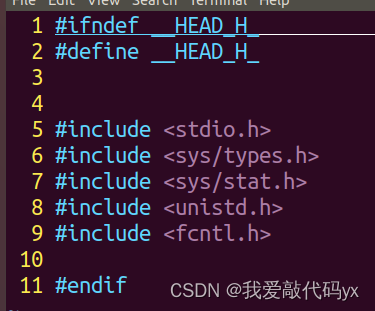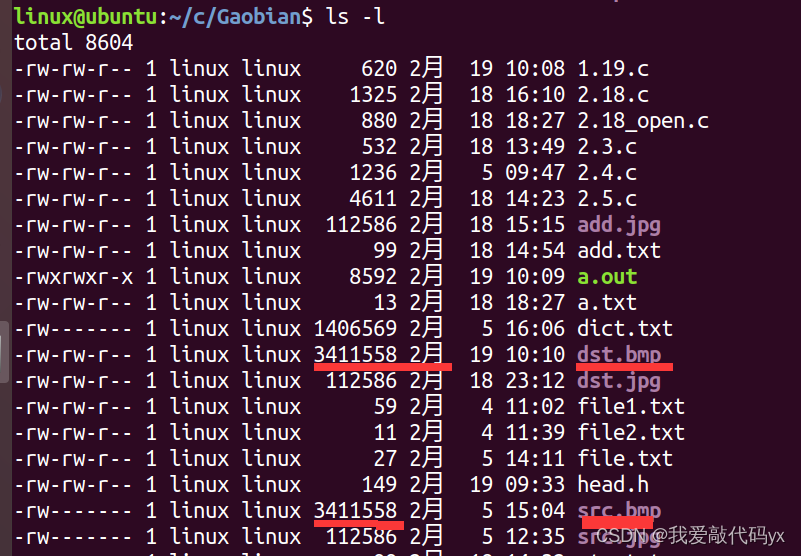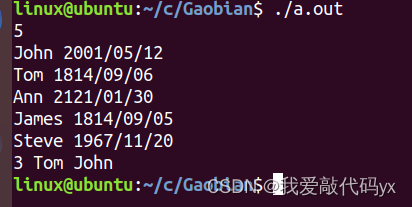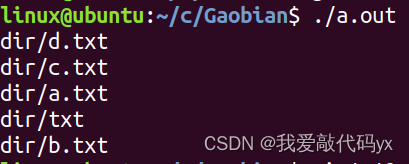自定义头文件示例:

定义好了之后调用规范:
#include "head.h"
注意:文件名要用双引号 不能用尖括号注意:" "和< >的区别
引用自定义头文件的格式是#include "自定义头文件名.h"
"":从用户的工作路径下搜索头文件
<>:从标准库路径下搜索头文件主函数传参:
int main(int argc,const char *argv[])
int main(int argc,const char **argv)
参数:
1.argc是int类型,表示运行程序的时候给main函数传递了几个参数
2.argv是一个字符串数组,这个数组用来存储argc个字符串,
每个字符串就是我们给main函数传的一个参数本质:
1.main函数传参都是通过字符串传进去的
2.程序被调用时传参,各个参数之间是通过空格来间隔的
3.在程序内部如果要使用argv,那么一定要先检验argc示例 :
利用read和write实现文件内容的拷贝(将src.bmp中的内容拷贝到dst.bmp文件中)
#include "head.h"
int main(int argc,const char *argv[])
{
int fscr = 0;
int fdst = 0;
char tmpbuff[4069] = {0};
ssize_t nret = 0;
if (argc != 3)
{
fprintf(stderr,"Usage:./a.out srcfilename dstfilename\n");
return -1;
}
fscr = open(argv[1],O_RDONLY);
if (fscr == -1)
{
perror("fail to open!");
return -1;
}
fdst = open(argv[2],O_RDWR | O_CREAT | O_TRUNC, 0664);
if (fdst == -1)
{
perror("fail to open!");
return -1;
}
while(1)
{
nret = read(fscr,tmpbuff,sizeof(tmpbuff));
if (nret <= 0)
{
break;
}
write(fdst,tmpbuff,nret);
}
close(fdst);
close(fscr);
return 0;
}
(将src.bmp拷贝到dst.bmp中)
编译结束后,运行代码参数:
./a.out src.bmp dst.bmp

#include "haed.h"
#include <string.h>
typedef struct persun
{
char name[8];
char birthday[15];
}Persun_t;
int main(void)
{
Persun_t a[100000];
int n = 0;
int i = 0;
int cot = 0;
char maxvalue[15] = {"2014/09/06"};
char minvalue[15] = {"1814/09/06"};
int maxnew = 0;
int minnew = 0;
scanf("%d",&n);
for (i = 0; i < n; i++)
{
scanf("%s%s",a[i].name,a[i].birthday);
}
for (i = 0; i < n; i++)
{
if (strcmp(a[i].birthday,maxvalue) <= 0 && strcmp(a[i].birthday,minvalue)>=0)
{
cot++;
if (cot == 1)
{
maxnew = minnew = i;
}
if (strcmp(a[i].birthday,a[maxnew].birthday)>0)
{
maxnew = i;
}
if (strcmp(a[i].birthday,a[minnew].birthday)<0)
{
minnew = i;
}
}
}
printf("%d %s %s\n",cot,a[minnew].name,a[maxnew].name);
return 0;
}

文件IO
1.lseek
off_t lseek (int fd,off_t offset,int whence);;
功能:
重新设定文件描述符的偏移量
参数:
fd:文件描述符
offset:偏移量
whence:SEEK_SET 文件开头
SEEK_CUR 文件当前位置
SEEK_END 文件末尾
返回值:
成功返回偏移量
失败返回-1
示例:
#include "head.h"
int main(void)
{
int fd = 0;
char ch = 0;
off_t len = 0;
fd = open("b.txt",O_WRONLY | O_CREAT | O_TRUNC, 0664);
if (fd == -1)
{
perror("fail to open!");
return -1;
}
len = lseek(fd,15,SEEK_SET);
printf("len=%ld\n",len);
ch = 'a';
write(fd,&ch,1);
len = lseek(fd,-3,SEEK_CUR);
printf("len=%ld\n",len);
ch = 'b';
write(fd,&ch,1);
len = lseek(fd,0,SEEK_SET);
printf("len=%ld\n",len);
ch = 'h';
write(fd,&ch,1);
close(fd);
return 0;
}
目录IO
1.mkdir
int mkdir(const char *pathname, mode_t mode);
功能:
创建目录文件
参数:
pathname:文件路径
mode:文件的权限
返回值:
成功返回0;
失败返回-1;
rwx rwx rwx
111 111 111
0777
r:目录中是否能够查看文件
w:目录中是否能够新创建文件
x:目录中是否能够进入2.rmdir
int rmdir(const char *pathname);
功能:
删除空文件目录
返回值:
成功返回0;
失败返回-1;
示例:
#include "head.h"
int main(void)
{
mkdir("dir", 0777);
rmdir("dir");
return 0;
}
3.opendir
DIR *opendir(const char *name);
功能:
打开目录获得目录流指针
参数:
name:目录文件路径
返回值:
成功返回目录流指针
失败返回NULL
4.closedir
int closedir(DIR *dirp);
功能:
关闭目录流指针
5.readdir
struct dirent *readdir(DIR *dirp);
功能:
从目录流中读取下一个目录项的结构体信息
参数:
dirp:目录流指针
返回值:
成功返回包含目录项的信息的空间首地址
失败返回NULL
读到文件末尾返回NILL
struct dirent {
ino_t d_ino; /* Inode number */
off_t d_off; /* Not an offset; see below */
unsigned short d_reclen; /* Length of this record */
unsigned char d_type; /* Type of file; not supported
by all filesystem types */
char d_name[256]; /* Null-terminated filename */
};
示例:
打开”dir“目录 读取里面的的信息
#include "head.h"
int main(void)
{
DIR *dp = NULL;
struct dirent *pp = NULL;
dp = opendir("dir");
if (NULL == dp)
{
perror("fail to opendir");
return -1;
}
while (1)
{
pp = readdir(dp);
if (NULL == pp)
{
break;
}
if ('.' == *pp->d_name)
{
continue;
}
printf("%s/%s\n", "dir", pp->d_name);
}
closedir(dp);
return 0;
}
6.chdir
int chdir(const char *path);
功能:
切换当前代码的工作路径
示例:
#include "head.h"
int main(void)
{
chdir("..");
mkdir("dirname", 0777);
return 0;
}
上面的程序运行的结果是将"dirname"目录创建的到当前目录的上一级目录中7.getcwd
char *getcwd(char *buf, size_t size);
功能:
获得当前代码的绝对路径
参数说明:
getcwd()会将当前工作目录的绝对路径复制到参数buffer所指的内存空间中,参数size为buf的空间大小。
示例:
获得当前目录的路径和上一级目录的路径并打印出来
#include "head.h"
int main(void)
{
char tmpbuff[4096] = {0};
getcwd(tmpbuff, sizeof(tmpbuff));
printf("tmpbuff = %s\n", tmpbuff);
chdir("..");
getcwd(tmpbuff, sizeof(tmpbuff));
printf("tmpbuff = %s\n", tmpbuff);
return 0;
}
练习:
递归遍历打印任意目录下的所有文件路径
#include "head.h"
int ListDir(const char *pdirname)
{
DIR *dp = NULL;
struct dirent *pp = NULL;
char tmpbuff[4096] = {0};
dp = opendir(pdirname); //打开我们需要遍历的目录 并用目录流指针接收
if (dp == NULL) //查看这个目录是否为空
{
perror("fail to opendir!");
return -1;
}
while(1)
{
pp = readdir(dp); //读出这个目录信息 并用结构体接收
if (pp == NULL) //如果为空 则跳出循环
{
break;
}
if ('.' == *pp->d_name) //如果度到的这的目录是以'.'开头 则跳过 进入下一次循环
{
continue;
}
sprintf(tmpbuff,"%s/%s",pdirname,pp->d_name); //将读到的目录的名字和 我们要查看的目录拼接起来形成一个路径放到tmpbuff这个数组中
printf("%s\n",tmpbuff); //打印这个数组
if (pp->d_type == DT_DIR) //如果这个文件的类型是目录类型
{
ListDir(tmpbuff); //继续递归
}
}
closedir(dp);
return 0;
}
int main(int argc,const char *argv[])
{
if (argc != 2)
{
fprintf(stderr,"Usage:./a.out dirname\n");
return -1;
}
ListDir(argv[1]);
return 0;
}
8.access
int access(const char *pathname, int mode);
功能:
检测调用函数的程序对文件是否拥有指定权限
参数;
pathname:文件路径
mode:R_OK 检测是否拥有读的权限
W_OK 检测是否拥有写权限
X_OK 检测是否拥有执行权限
F_OK 检测文件是否存在
返回值:
有该权限返回0
出错返回-1
示例:
#include "head.h"
int main(int argc, const char *argv[])
{
int ret = 0;
if (argc != 2)
{
fprintf(stderr, "Usage:./a.out filename\n");
return -1;
}
ret = access(argv[1], F_OK);
if (0 == ret)
{
printf("该文件存在!\n");
}
else
{
printf("该文件不存在!\n");
}
return 0;
}






















 191
191











 被折叠的 条评论
为什么被折叠?
被折叠的 条评论
为什么被折叠?










